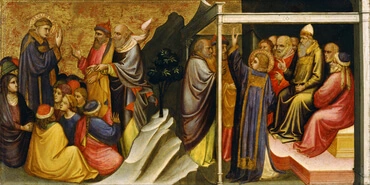God

When the Bible speaks of "Jehovah," it is representing love itself, the inmost love that is the essence of the Lord. That divine love is one, whole and complete in itself, and Jehovah also is one, a name applied only to the Lord. The divine love expresses itself in the form of wisdom. Love, then, is the essence of God -- His inmost. Wisdom -- the loving understanding of how to put love into action -- is slightly more external, giving love a way to express itself. Wisdom, however, is expressed in a great variety of thoughts and ideas, what the Writings collectively call divine truth. There are also many imaginary gods, and sometimes angels and people can be called gods (the Lord said Moses would be as a god to Aaron). So when the Bible calls the Lord "God," it is in most cases referring to divine truth. In other cases, "God" has reference to what is called the divine human. The case there is this: As human beings, we cannot engage the Lord directly as divine love. It is too powerful and too pure. Instead, we have to approach Him by understanding Him through divine truth. Divine truth, then, is the Lord in human form, a form we can approach and understand. Thus "God" is also used in reference to this human aspect, because it is an expression of truth.
This video is a product of the New Christian Bible Study Corporation. Follow this link for more information and more explanations - text, pictures, audio files, and videos: www.newchristianbiblestudy.org
This video is a product of the New Christian Bible Study Corporation. Follow this link for more information and more explanations - text, pictures, audio files, and videos: www.newchristianbiblestudy.org
Elders

Like most meanings in the Bible this can change depending on context to a meaning perverted into the opposite. Instead of a mind full of knowledge and love of the neighbor, the love can be twisted around to pride in one's own self-intelligence and lead toward evil instead of good. The elders and chief priests who sat in judgment on Jesus in Caiaphas' house show the other side of the representation. Elders are mentioned in the Bible mainly in two ways: First the elders of Israel: and second the 24 elders seated about the throne of God in Revelation. In both cases, they mean wisdom, which comes from using the truths we've learned to do what's right in our everyday lives. The elders of Israel mean the chief things of wisdom in the church called Israel. The elders mentioned in Revelation 4 mean the wisdom of the highest heavens, and by extension the whole of the heavens.








